
Connie Smith is an American country music singer and songwriter. Her contralto vocals have been described by music writers as significant and influential to the women of country music. A similarity has been noted between her vocal style and the stylings of country vocalist Patsy Cline. Other performers have cited Smith as influence on their own singing styles, which has been reflected in quotes and interviews over the years.
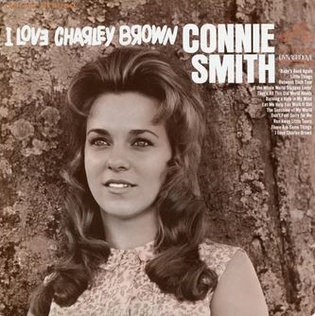
I Love Charley Brown is the tenth studio album by American country singer Connie Smith. It was released in April 1968 via RCA Victor and featured 12 tracks. The album reached the top 20 of the American country albums chart. It was described as a collection of pop-inspired country songs. Included were four cuts written by Smith's longtime songwriting collaborator, Dallas Frazier. Among his cuts was one of the album's three singles, "Run Away Little Tears". Along with Frazier's cut, the two additional singles included reached the top ten of the American country songs chart. The album was met with favorable reviews from critics.
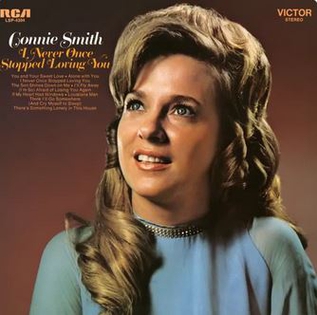
I Never Once Stopped Loving You is the fourteenth solo studio album by American country singer Connie Smith. It was released in September 1970 on RCA Victor and contained ten tracks. The collection mixed original material with covers of previously-recorded songs. Three singles were included on the album: "You and Your Sweet Love", the title track and "Louisiana Man". Both "You and Your Sweet Love" and the title track reached the top ten on the American country songs chart in 1970. The album itself charted in the top 20 of the American country LP's survey. Billboard magazine gave the LP a positive response following its original release.

Ain't We Havin' Us a Good Time is the eighteenth solo studio album by American country singer Connie Smith. It was released in April 1972 on the RCA Victor label. The project contained a total of ten tracks which were considered to have a "thicker seventies" sound, according to one biographer. Included on the album was Smith's single, "Just for What I Am". It became a top five single on the North American country songs chart while the album itself reached the American country LP's top 25. Ain't We Havin' Us a Good Time received a favorable review from Billboard magazine following its release.

"If It Ain't Love" and Other Great Dallas Frazier Songs is nineteenth solo studio album by American country singer Connie Smith. It was released in July 1972 via RCA Victor and contained ten tracks. The album is a collection of songs composed by songwriter Dallas Frazier. Three of these songs were duets between Smith and Frazier himself. The album's title track was spawned as a single in 1972 and reached the top ten of the American country chart. The album itself reached the top 20 of the American country LP's chart and it received a positive review from Billboard magazine.

Love Is the Look You're Looking for is a compilation album by American country singer Connie Smith. It was released in February 1973 via RCA Victor and contained ten tracks. It was Smith's third compilation released by the RCA Victor label and mostly included previously-recorded material. The album was issued following Smith's exit from RCA's roster. It was named for its title track, which became a top ten single on the North American country singles charts. The album itself would chart on the American country LP's chart in 1973.
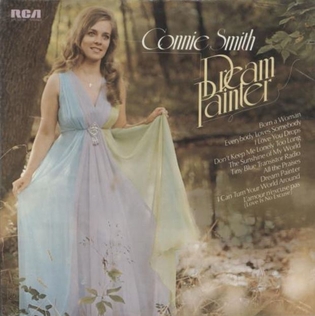
Dream Painter is a compilation album by American country singer Connie Smith. It was released in July 1973 via RCA Victor and contained ten tracks. The album was released following Smith's departure from RCA Victor and contained previously-released material. Two new recordings were also featured, including the title track. Released as a single, the title track would reach the top 30 of American country songs chart. The album itself would chart the American country LP's chart in 1973.
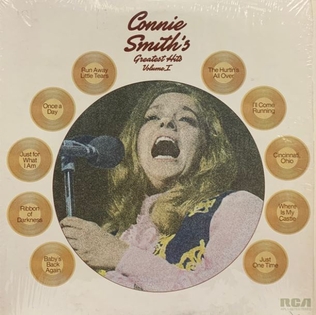
Connie Smith's Greatest Hits, Vol. I is a compilation album by American country singer Connie Smith. It was released in October 1973 via RCA Victor and contained ten tracks. The disc was one of several compilations released following Smith's departure from the RCA label. It included ten of Smith's most popular singles from her career, such as the number one single, "Once a Day", and top ten single, "The Hurtin's All Over". The album charted on the American country LP's chart in 1973 and received a positive review from Billboard magazine.

A Lady Named Smith is the twentieth solo studio album by American country singer Connie Smith. It was released in May 1973 via Columbia Records and contained 11 tracks. The album was her first with the Columbia label. Its production and style featured a string instrumentation to help market Smith in the pop field. Included were a mix of new material and covers of previously-recorded songs by other artists. The album's only single was the original tune, "You've Got Me ", which reached the American country songs chart in 1973. A Lady Named Smith would also chart on the American country albums chart in 1973.
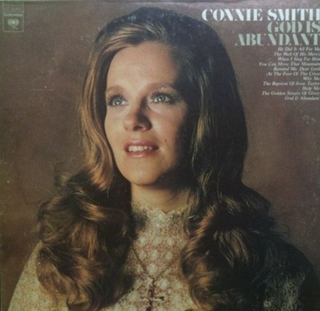
God Is Abundant is the twenty-first solo studio album by American country singer Connie Smith. It was released in November 1973 on Columbia Records and contained 11 tracks. The project was a collection of gospel recordings, chosen by Smith herself. Several of the songs included on the project were written by other country artists including Larry Gatlin, Kris Kristofferson and Dolly Parton. The album reached the top 20 of the American country LP's chart following its release.

That's the Way Love Goes is the twenty-second solo studio album by American country singer Connie Smith. It was released in March 1974 on Columbia Records and contained 11 tracks. The album included both original material and covers of songs first recorded by other music artists. Two singles were released from the album. "Ain't Love a Good Thing" reached the top ten of the American country songs chart and became her nineteenth top ten single in her career.

I Never Knew (What That Song Meant Before) is the twenty-third solo studio album by American country singer Connie Smith. It was released in August 1974 on Columbia Records and contained 11 tracks. The album was a mix of original material and covers of songs by other artists. The project was described as a set of traditional songs. Its title track was a single that reached the top 20 of the American country songs chart. The album itself charted the American country LP's chart following its release. The project was met with a favorable review from Billboard magazine.

I Got a Lot of Hurtin' Done Today / I've Got My Baby on My Mind is the twenty-fourth solo studio album by American country singer Connie Smith. It was released in January 1975 and contained 11 tracks. It was also considered to be one of her "most commercially-successful" discs of the decade, according to biographer Barry Mazor. Three singles were included on the project. Both "I've Got My Baby on My Mind" and her cover of "Why Don't You Love Me" reached the top 15 of the American country songs chart. "I Got a Lot of Hurtin' Done Today" would chart in the top 30. The album itself reached the American country LP's chart in early 1975. Billboard gave the album a positive review following its release.
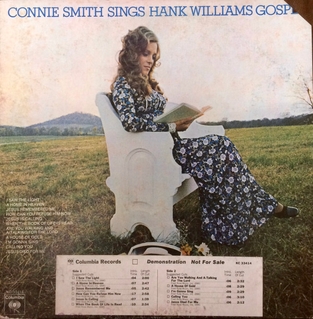
Connie Smith Sings Hank Williams Gospel is the twenty-fifth solo studio album by American country singer Connie Smith. It was released in May 1975 via Columbia Records and contained 11 tracks. The project was a tribute to Hank Williams and was considered the first tribute gospel album of his material. Smith had found over half of the album's material through previously-unreleased recordings. The album would make a brief chart appearance on the American Country LP's survey in 1975.
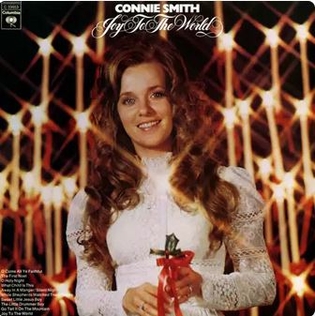
Joy to the World is the twenty-sixth solo studio album by American country singer Connie Smith. It was released in October 1975 via Columbia Records and originally contained ten tracks. It was re-released decades later by Real Gone Music to digital sites and featured one new track. The album was Smith's first album of Christmas music.

I Don't Wanna Talk It Over Anymore is the twenty-eight solo studio album by American country singer Connie Smith. It was released in October 1976 and contained ten tracks. The project's name was derived from the title track, which was one of three singles included. Its other single releases included a cover The Everly Brothers's "So Sad " and an original tune called "The Latest Shade of Blue". The title track was the album's most successful single, placing in the top 20 of the American country songs chart. The album received a positive response from Billboard magazine following its release. It was also Smith's final studio project released with the Columbia label.

Pure Connie Smith is the twenty-ninth solo studio album by American country singer Connie Smith. It was released in November 1977 via Monument Records and contained ten tracks. The album was Smith's first with the Monument label. The album was recorded in a country pop production style featuring mostly new recordings. One single was released from the album, "Coming Around". The song charted the American country songs chart in 1977.

New Horizons is the thirtieth solo studio album by American country singer Connie Smith. It was released in March 1978 and contained ten tracks. She had recently switched to Monument after several years with Columbia Records. The album was cut in a country pop production style that Smith felt pressured into. Yet three singles made the American country songs chart between 1977 and 1978, including the top 20 "I Just Want to Be Your Everything".
"The Song We Fell in Love To" is a song by American country music singer Connie Smith. It was composed by Ray Baker and Tupper Saussy and released as a single via Columbia Records in 1975. The song became a top 30 hit on the American country music chart in 1976 and was released on an album of the same name.
"Ridin' Rainbows" is a song written by Jan Crutchfield, Connie Etheridge and Susan Pugh, and recorded by American country music artist Tanya Tucker. It was released in December 1976. It became a top 20 single on the American country songs chart and a top ten single on the Canadian country songs chart in 1977. The song was the first single and title track from Tucker's album Ridin' Rainbows.


















